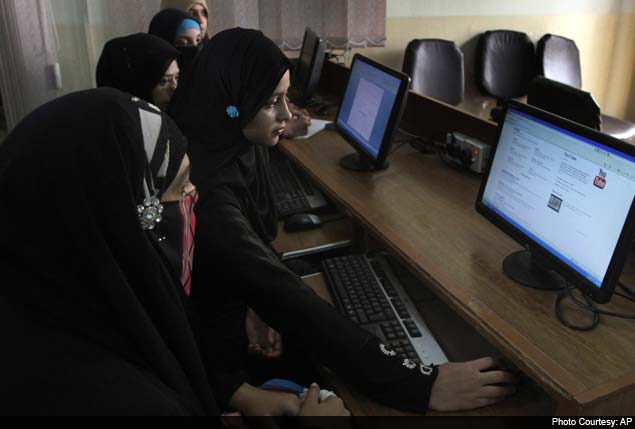- Home
- Internet
- Internet News
- Google sticks with VP8 as Cisco, Mozilla embrace H.264 as default WebRTC codec
Google sticks with VP8 as Cisco, Mozilla embrace H.264 as default WebRTC codec
By Anupam Saxena | Updated: 31 October 2013 14:56 IST

Click Here to Add Gadgets360 As A Trusted Source

Advertisement
The war of video standards is now being fought online with Google and Cisco sticking their guns in their respective VP8 and H.264 online video codec standards.
While Mozilla has aligned forces with Cisco as its Firefox web browser is the first project to make use of the proprietary H.264 codec, Google plans to stick to the open VP8 standard. Cisco had announced that it would offer third-party developers a freely usable version of H.264, with Cisco bearing the patent licensing costs as it's owned by MPEG LA.
Google's Chrome browser also offers support for WebRTC features but pushes its VP8 standard.
According to a report by GigaOm, the Internet Engineering Task Force would be meeting next week, in Vancouver to decide which codec should become part of the new WebRTC interoperable voice and video chat standard for browsers and apps.
A Google spokesperson told GigaOm that it backs the license-free VP8 video codec. The spokesperson said, "We continue to believe that open platforms should encourage open and royalty free technology. There is strong industry momentum behind the open, royalty free VP8 video format. We hope that the IETF community will come together in voting against royalty encumbered technology as they slow down the pace of innovation on the web and on the internet."
WebRTC (Web Real-Time Communications), is an API through which developers can offer video calls, voice calls and file sharing without the need for additional software or use third-party plugins. However, it's being debated as to which video codec standard should be adopted under the standard. It's interesting to note that Mozilla is also working on a new codec called Daala that won't need any license agreements.
While Mozilla has aligned forces with Cisco as its Firefox web browser is the first project to make use of the proprietary H.264 codec, Google plans to stick to the open VP8 standard. Cisco had announced that it would offer third-party developers a freely usable version of H.264, with Cisco bearing the patent licensing costs as it's owned by MPEG LA.
Google's Chrome browser also offers support for WebRTC features but pushes its VP8 standard.
According to a report by GigaOm, the Internet Engineering Task Force would be meeting next week, in Vancouver to decide which codec should become part of the new WebRTC interoperable voice and video chat standard for browsers and apps.
A Google spokesperson told GigaOm that it backs the license-free VP8 video codec. The spokesperson said, "We continue to believe that open platforms should encourage open and royalty free technology. There is strong industry momentum behind the open, royalty free VP8 video format. We hope that the IETF community will come together in voting against royalty encumbered technology as they slow down the pace of innovation on the web and on the internet."
WebRTC (Web Real-Time Communications), is an API through which developers can offer video calls, voice calls and file sharing without the need for additional software or use third-party plugins. However, it's being debated as to which video codec standard should be adopted under the standard. It's interesting to note that Mozilla is also working on a new codec called Daala that won't need any license agreements.
Comments
Get your daily dose of tech news, reviews, and insights, in under 80 characters on Gadgets 360 Turbo. Connect with fellow tech lovers on our Forum. Follow us on X, Facebook, WhatsApp, Threads and Google News for instant updates. Catch all the action on our YouTube channel.
Related Stories
Popular on Gadgets
- Samsung Galaxy Unpacked 2026
- iPhone 17 Pro Max
- ChatGPT
- iOS 26
- Laptop Under 50000
- Smartwatch Under 10000
- Apple Vision Pro
- Oneplus 12
- OnePlus Nord CE 3 Lite 5G
- iPhone 13
- Xiaomi 14 Pro
- Oppo Find N3
- Tecno Spark Go (2023)
- Realme V30
- Best Phones Under 25000
- Samsung Galaxy S24 Series
- Cryptocurrency
- iQoo 12
- Samsung Galaxy S24 Ultra
- Giottus
- Samsung Galaxy Z Flip 5
- Apple 'Scary Fast'
- Housefull 5
- GoPro Hero 12 Black Review
- Invincible Season 2
- JioGlass
- HD Ready TV
- Latest Mobile Phones
- Compare Phones
Latest Gadgets
- Tecno Pova Curve 2 5G
- Lava Yuva Star 3
- Honor X6d
- OPPO K14x 5G
- Samsung Galaxy F70e 5G
- iQOO 15 Ultra
- OPPO A6v 5G
- OPPO A6i+ 5G
- Asus Vivobook 16 (M1605NAQ)
- Asus Vivobook 15 (2026)
- Brave Ark 2-in-1
- Black Shark Gaming Tablet
- boAt Chrome Iris
- HMD Watch P1
- Haier H5E Series
- Acerpure Nitro Z Series 100-inch QLED TV
- Asus ROG Ally
- Nintendo Switch Lite
- Haier 1.6 Ton 5 Star Inverter Split AC (HSU19G-MZAID5BN-INV)
- Haier 1.6 Ton 5 Star Inverter Split AC (HSU19G-MZAIM5BN-INV)
© Copyright Red Pixels Ventures Limited 2026. All rights reserved.







![[Partner Content] OPPO Reno15 Series: AI Portrait Camera, Popout and First Compact Reno](https://www.gadgets360.com/static/mobile/images/spacer.png)









